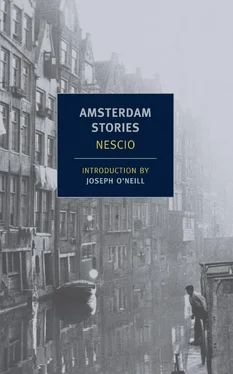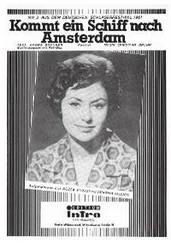Japi’s teeth chattered. There was not a single sip of jenever left in the house and no way to get any on credit.
Then Japi got sentimental. He started to talk about Jeanne, for no particular reason, and as though we already knew everything about her. That her hands were so soft, and so warm, and how her eyes could sparkle. She had dark eyes and black hair. We started getting uncomfortable. He told us the most horribly private things, about a white lace dress, about a lavender silk dress, about her little white feet, about all sorts of body parts you can’t write about in a story.
By the end he was talking in French, we heard the words “ chéri ” and “ chérie ” several dozen times. (He pronounced the final “e” in “ chérie. ”) Then he was speaking Dutch again and got to the point. She was going to divorce her husband, a revolting old prune twenty years older than she was. We found it all rather banal. And on March 1 he had to show up at the office. Then he rubbed his face with his hands and said, “I’m leaving. Shake.” He stumbled down the stairs.
He did not show up on March 1. It was April before he was in any shape to go to work again. His freeloading days were over.
One evening a few months later, Bavink saw him sitting on the fourth floor of some office building. He was sitting in the window, working, and the place was brightly lit. Bavink went upstairs. Japi was alone and very busy. Bavink couldn’t get anything out of him— he just kept working and hardly said a thing. Bavink nosed around, took a book off the shelf here and there, flipped through it, and put it back, shook his head, said “Whoa” a few times, turned the handle on the mimeograph, looked down at the street, and opened all the windows for some fresh air.
Outside a light snow was falling. Some snowflakes blew in. “Shut the windows, please,” Japi said, and kept writing. Then Bavink picked up a copy book, read a bit in it, shook his head again and again, and walked over to Japi, the copy book open in his hand.
“Hey, did you write all this?” Japi barely looked up and just said, “Not all of it.” “You’re pretty damn smart after all,” Bavink said, “this business stuff isn’t easy.” Then Bavink left.
VII
Japi turned into a hard worker. Not long after Bavink’s visit they sent him to Africa. Within two years he was back: sick, half dead. No one heard anything from him until I saw him one November afternoon standing next to the stone wall of the Wijk bij Duurstede harbor. There he stood, staring at the mud. I had trouble recognizing him. He was dressed in a bulky gray coat, much too big for him, with a bulky gray cap down over his eyes and ears. He had on a pair of bulky wide square-toed brown shoes and there were several young men behind him. I thought: That looks like Japi, actually. And yes, it was him, a bit pale and thin and with no beard or mustache and with a strange staring look in his eyes, but definitely Japi.
Japi didn’t see anything, didn’t hear anything. I tapped him on the shoulder and said, “What are you doing here, how’s it going, what’s brought you here?” He stuck out his hand and said nothing, and was not surprised. “Just standing here staring,” he said.
“I can see that,” I said. “Come have a drink?” “Good,” Japi said. The louts who were leaning against the stone wall a ways off, amusing themselves for some time with very loud, ill-mannered commentary, now made very respectful greetings, since I had been throwing around quite a bit of money in Wijk bij Duurstede and had even slapped the notary on the back that very Sunday.
After a glass of jenever, some life came back into Japi. He had been working in Africa, tormented by the heat and the mosquitoes, had come down with a fever — spent more time suffering from fever than working or doing anything else. He’d come back that summer practically skin and bones.
His française was living in Paris with a young Dutchman who’d been articled to an office for a monstrously long time. Had another boyfriend too, a colonel. Treated him to dinner in Paris and called him a “good beast” in her broken Dutch and laughed in his face. Fastened her garter belt while he was right there so that he’d seen her bare knee. Then sent him away. He had to laugh. He wasn’t in love anymore. She’d had a light blue silk slip on. One time he saw her having a drink with the colonel at an outdoor table. The colonel was acting very smug and looked savage and overbearing. She gave Japi the eye behind the colonel’s back. She had lung problems and her months were numbered. Still, lively as ever. But had a hard time walking.
And what were Japi’s plans? Still a freeloader? He freeloaded on his office, he said; the last day of every month he went and got his money.
Was he going to turn into such a ferocious worker again?
Oh, no. He had driven himself too hard. He’d aged fifteen years in the last three or four.
Then he lit a fresh cigar, one of mine, an expensive one with a band. I was doing well in those days. He took the band off.
He had toiled away, seen his share of misery. It started in Marchienne-au-Pont and Charleroi. He’d gone there for fun, with Jeanne. After three days she had had enough; he stayed. He showed me a little photograph: a grinning death’s-head, the daughter of a worker in a glass factory. Seven children, five dead, and the sixth died while he was boarding there, she was the one in the photo. There he had learned to look, had seen what work really is. He’d always known how to have a damned good time spending money while other people earned it. Now he let it get to him and drove himself hard. Thought about becoming a socialist. He’d worked for his bread, been hounded, hounded and oppressed by people and by necessity, just like everyone else. He’d worked nights; in Amsterdam he came home from the office at one or two in the morning, then sat up, brooded, scribbled, written whole novels and burned them.
What could he do? What did they accomplish with all that? He let it get to him, dreamed up fiery speeches and ferocious articles while he sat in the office and worked on his boss’s business, worked hard, everyone was amazed at the quantities of work he could put away. The world was still turning, turning exactly the way it always had, and it would keep on turning without him. He let it get to him. Now he was more sensible. He washed his hands of it. There were enough salesmen and writers and talkers and people who let it get to them — more than enough.
And they were always afraid of something and sad about something. Always scared to be late somewhere or get a scolding from someone, or they couldn’t make ends meet, or the toilet was stopped up, or they had an ulcer, or their Sunday suit was starting to wear thin, or the rent was due; they couldn’t do this because of that and couldn’t possibly do that because of this. When he was young he was never that stupid. Smoke a couple cigars, chat a little, look around a bit, enjoy the sunshine when it was there and the rain when it wasn’t, and not think about tomorrow, not want to become anybody, not want a thing except a little nice weather now and then.
You can’t sustain that. He knew that. It couldn’t last, it was impossible, you’d need a mountain of money. And he didn’t have one. What his old man might leave him wasn’t worth the trouble. And he, Japi, thought that was just fine. Now he spent his time staring. It’s not like it’s possible to accomplish anything anyway. He still hung around the places he used to like and spent his time staring into rivers. He got through several weeks staring in Dordrecht. In Veere he sat up on the roof of the Hospitaal for days. He’d spent September in Nijmegen.
Читать дальше



![Олеся Проглядова - Nomen nescio. Имя неизвестно [litres]](/books/391740/olesya-proglyadova-nomen-nescio-imya-neizvestno-lit-thumb.webp)








